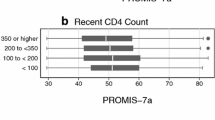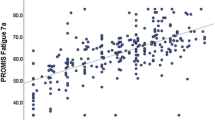Abstract
Purpose
Computer-adaptive tests (CATs) can measure precisely at individual level with few items selected from an item bank. Our aim was to select fatigue items to develop a CAT for rheumatoid arthritis (RA) and include expert opinions that are important for content validity of measurement instruments.
Methods
Items were included from existing fatigue questionnaires and generated from interview material. In a Delphi procedure, rheumatologists, nurses, and patients evaluated the initial pool of 294 items. Items were selected for the CAT development if rated as adequate by at least 80% of the participants (when 50% or less agreed, they were excluded). Remaining items were adjusted based on participants’ comments and re-evaluated in the next round. The procedure stopped when all items were selected or rejected.
Results
A total of 10 rheumatologists, 20 nurses, and 15 rheumatoid arthritis patients participated. After the first round, 96 of 294 items were directly selected. Nine items were directly excluded, and remaining items were adjusted. In the second round, 124 items were presented for re-evaluation. Ultimately, 245 items were selected.
Conclusion
This study revealed a qualitatively evaluated item pool to be used for the item bank/CAT development. The Delphi procedure is a beneficial approach to select adequate items for measuring fatigue in RA.

Similar content being viewed by others
References
Rose, M., & Bezjak, A. (2009). Logistics of collecting patient-reported outcomes (PROs) in clinical practice: an overview and practical examples. Quality of Life Research, 18, 125–136.
Hambleton, R. K., Swaminathan, H., & Rogers, H. J. (1991). Fundamentals of Item response theory. Thousand Oaks: Sage.
Walter, O. B. (2010). Adaptive tests for measuring anxiety and depression. In W. J. van der Linden & C. A. W. Glas (Eds.), Elements of adaptive testing (pp. 123–136). New York: Springer.
Wouters, H., Zwinderman, A. H., van Gool, W. A., Schmand, B., & Lindeboom, R. (2009). Adaptive cognitive testing in dementia. International Journal of Methods in Psychiatric Research, 18(2), 118–127.
Lai, J.-S., Cella, D., Chang, C.-H., Bode, R. K., & Heinemann, A. W. (2003). Item banking to improve, shorten and computerize self-reported fatigue: An illustration of steps to create a core item bank from the FACIT-fatigue scale. Quality of Life Research, 12, 485–501.
Lai, J.-S., Cella, D., Dineen, K., Bode, R., von Roenn, J., Gershon, R. C., et al. (2005). An item bank was created to improve the measurement of cancer-related fatigue. Journal of Clinical Epidemiology, 58, 190–197.
Cella, D., Yount, S., Rothrock, N., Gershon, R., Cook, K., Reeve, B., et al. (2007). The patient-reported outcomes measurement information system (PROMIS): Progress of an NIH Roadmap Cooperative Group during its first two years. Medical Care, 45, I3–I11.
Fliege, H., Becker, J., Walter, O. B., Bjorner, J. B., Klapp, B. F., & Rose, M. (2005). Development of a computer-adaptive test for depression (D-CAT). Quality of Life Research, 14, 2277–2291.
Walter, O. B., Becker, J., Bjorner, J. B., Fliege, F., Klapp, B. F., & Rose, M. (2007). Development and evaluation of a computer adaptive test for “anxiety” (Anxiety-CAT). Quality of Life Research, 16, 143–155.
Fliege, H., Becker, J., Walter, O. B., Rose, M., Bjorner, J. B., & Klapp, B. F. (2009). Evaluation of a computer-adaptive test for the assessment of depression (D-CAT) in clinical application. International Journal of Methods in Psychiatric Research, 18(1), 23–36.
Becker, J., Fliege, H., Kocalevent, R. D., Bjorner, J. B., Rose, M., Walter, O. B., et al. (2008). Functioning and validity of a computerized adaptive test to measure anxiety (A-CAT). Depression and Anxiety, 25, 182–194.
Kocalevent, R. D., Rose, M., Becker, J., Walter, O. B., Fliege, H., Bjorner, J. B., et al. (2009). An evaluation of patient-reported outcomes found computerized adaptive testing was efficient in assessing stress perception. Journal of Clinical Epidemiology, 62, 278–287.
Kvien, T. K., Scherer, H. U., & Burmester, G.-H. (2009). Rheumatoid arthritis. In J. W. J. Bijlsma (Ed.), EULAR compendium on rheumatic diseases (pp. 61–80). London: BMJ Publishing Group and European League Against Rheumatism.
Wolfe, F., Hawley, D. J., & Wilson, K. (1996). The prevalence and meaning of fatigue in rheumatic disease. Journal of Rheumatology, 23(8), 1407–1417.
Belza, B. L., Henke, C. J., Yelin, E. H., Epstein, W. V., & Gilliss, C. L. (1993). Correlates of fatigue in older adults with rheumatoid arthritis. Nursing Research, 42(2), 93–99.
Hewlett, S., Carr, M., Ryan, S., et al. (2005). Outcomes generated by patients with rheumatoid arthritis: how important are they? Musculoskeletal Care, 3, 131–142.
Kirwan, J. R., Newman, S., Tugwell, P. S., & Wells, G. A. (2009). Patient perspective on outcomes in rheumatology—a position paper for OMERACT 9. Journal of Rheumatology, 36(9), 2067–2070.
Kirwan, J. R., & Hewlett, S. (2007). Patient perspective: reasons and methods for measuring fatigue in rheumatoid arthritis. Journal of Rheumatology, 34, 1171–1173.
Kirwan, J. R., Minnock, P., Adebajo, A., et al. (2007). Patient perspective: fatigue as a recommended patient centered outcome measure in rheumatoid arthritis. Journal of Rheumatology, 34, 1174–1177.
Minnock, P., Kirwan, J., & Bresnihan, B. (2009). Fatigue is a reliable, sensitive and unique outcome measure in rheumatoid arthritis. Rheumatology, 48, 1533–1536.
Belza Tack, B. (1990). Fatigue in rheumatoid arthritis. Conditions, strategies, and consequences. Arthritis Care & Research, 3(2), 65–70.
Hewlett, S., Cockshott, Z., Byron, M., Kitchen, K., Tipler, S., Pope, D., et al. (2005). Patients’ perceptions of fatigue in rheumatoid arthritis: Overwhelming, uncontrollable, ignored. Arthritis Care & Research, 53(5), 697–702.
Repping-Wuts, H., Uitterhoeve, R., van Riel, P., & van Achterberg, T. (2008). Fatigue as experienced by patients with rheumatoid arthritis (RA): A qualitative study. International Journal of Nursing Studies, 45, 995–1002.
Nikolaus, S., Bode, C., Taal, E., & van de Laar, M. A. F. J. (2010). New insights into the experience of fatigue among patients with rheumatoid arthritis: A qualitative study. Annals of the Rheumatic Diseases, 69(5), 895–897.
Hewlett, S., Hehir, M., & Kirwan, J. R. (2007). Measuring fatigue in rheumatoid arthritis: A systematic review of scales in use. Arthritis and Rheumatism, 57(3), 429–439.
Ware, J. E., Jr., & Sherbourne, C. D. (1992). The MOS 36-item short-form health survey (SF-36). I. Conceptual framework and item selection. Medical Care, 30, 473–483.
Cella, D., Yount, S., Sorensen, M., Chartash, E., Sengupta, N., & Grober, J. (2005). Validation of the Functional Assessment of Chronic Illness Therapy Fatigue Scale relative to other instrumentation in patients with rheumatoid arthritis. Journal of Rheumatology, 32, 811–819.
McNair, D., Lorr, M., & Droppelman, L. (1992). Profile of mood states manual. New York: Multi-health Systems Inc.
Belza Tack, B. (1991). Dimensions and correlates of fatigue in older adults with rheumatoid arthritis (dissertation). San Francisco: University of California.
Nicklin, J., Cramp, F., Kirwan, J., Greenwood, R., Urban, M., & Hewlett, S. (2010). Measuring fatigue in rheumatoid arthritis: A cross-sectional study to evaluate the Bristol Rheumatoid Arthritis Fatigue Multi-Dimensional questionnaire, visual analogue scales, and numerical rating scales. Arthritis Care & Research, 62(11), 1559–1568.
Powell, C. (2003). The Delphi technique: Myths and realities. Journal of Advanced Nursing, 41, 376–382.
Streiner, D. L., & Norman, G. R. (2003). Health measurement scales—a practical guide to their development and use. New York: Oxford University Press.
Fayers, P. M., & Machin, D. (2000). Quality of life—assessment, analysis and interpretation. Chichester: Wiley.
Yorkston, K. M., Johnson, K., Boesflug, E., Skala, J., & Amtmann, D. (2010). Communication about the experience of pain and fatigue in disability. Quality of Life Research, 19(2), 243–251.
De Wit, M. (2010). From orphan outcome to darling pet—patient participation at OMERACT and the emergence of fatigue as an important outcome for research. Annals of the Rheumatic Diseases, 69(Suppl3), 23.
Nikolaus, S., Bode, C., Taal, E., & van de Laar, M. A. F. J. (submitted). Which dimensions of fatigue should be measured in patients with rheumatoid arthritis?—a Delphi study.
Nikolaus, S., Bode, C., Taal, E., & van de Laar, M. A. F. J. (submitted). Experts’ evaluations of fatigue questionnaires used in rheumatoid arthritis—a Delphi study among patients, nurses and rheumatologists in the Netherlands.
Jones, J., & Hunter, D. (1995). Qualitative research: consensus methods for medical and health services research. British Medical Journal, 311, 376–380.
Van der Zee, K. I., & Sanderman, R. (1993). Het meten van de algemene gezondheidstoestand met de RAND-36—een handleiding. Rijksuniversiteit Groningen: Noordelijk Centrum voor Gezondheidsvraagstukken.
FACIT Functional Assessment of Chronic Illness Therapy. (2009). http://www.facit.org. Accessed 16 July 2009.
Cluydts, R. J. G. (1979). Gemoedstoestanden en slaap—een experimenteel onderzoek [dissertation]. Brussel: Vrije Universiteit Brussel.
MAPI INSTITUTE. (2009). http://www.mapi-institute.com. Accessed 31 July 2009.
Guillemin, F., Bombardier, C., & Beaton, D. (1993). Cross-cultural adaptation of health-related quality of life measures: Literature review and proposed guidelines. Journal of Clinical Epidemiology, 46(12), 1417–1432.
Nikolaus, S., Bode, C., Taal, E., & van de Laar, M. A. F. J. (2010). Four different patterns of fatigue in rheumatoid arthritis patients: Results of a Q-sort study. Rheumatology, 49(11), 2191–2199.
Hjollund, N. H., Andersen, J. H., & Bech, P. (2007). Assessment of fatigue in chronic disease: A bibliographic study of fatigue measurement scales. Health and Quality of life Outcomes, 5(art. no. 12).
Lwin, C. T. T., Bishay, M., Platts, R. G., Booth, D. A., & Bowman, S. J. (2003). The assessment of fatigue in primary Sjögren′s Syndrome. Scandinavian Journal of Rheumatology, 32, 33–37.
Neuberger, G. B. (2003). Measures of fatigue. Arthritis and Rheumatism, 49(5S), S175–S183.
Dittner, A. J., Wessely, S. C., & Brown, R. G. (2004). The assessment of fatigue—a practical guide for clinicians and researchers. Journal of Psychosomatic Research, 56, 157–170.
Ad hoc committee on systemic lupus erythematosus response criteria for fatigue. (2007). Measurement of fatigue in systemic lupus erythematosus: A systematic review. Arthritis and Rheumatism, 57(8), 1348–1357.
Minton, O., & Stone, P. (2009). A systematic review of the scales used for the measurement of cancer-related fatigue (CRF). Annals of Oncology, 20, 17–25.
Whithead, L. (2009). The measurement of fatigue in chronic illness: A systematic review of unidimensional and multidimensional fatigue measures. Journal of Pain and Symptom Management, 3(1), 107–128.
Patient-Reported Outcomes Measurement Information System (PROMIS). (2009). Preliminary item pools—fatigue (fatigue-experience and fatigue-impact). http://www.nihpromis.org/Web%20Pages/Preliminary%20Item%20Banks%20[2006]aspx. Accessed 13 November 2009.
SurveyMonkey [http://www.surveymonkey.com].
Avouac, J., Kowal-Bielecka, O., Landewe, R., Chwiesko, S., Miniati, I., Czirjak, L., et al. (2009). European league against rheumatism (EULAR) scleroderma trial and research group (EUSTAR) recommendations for the treatment of systemic sclerosis: Methods of elaboration and results of systematic literature research. Annals of the Rheumatic Diseases, 68, 629–634.
Lai, J.-S., Cook, K., Stone, A., Beaumont, J., & Cella, D. (2009). Classical test theory and item response theory/Rasch model to assess differences between patient-reported fatigue using 7-day and 4-week recall periods. Journal of Clinical Epidemiology, 62, 991–997.
Statistics Netherlands. (2010). http://www.cbs.nl/nl-NL/menu/themas/arbeid-sociale-zekerheid/publicaties/artikelen/archief/2005/2005-1825-wm.htm. Accessed 13 October 2010.
Acknowledgments
We would like to thank the participants in this study; patients from the forum of Patient Research Partners of the Arthritis Centre Twente; and rheumatologists and nurses from Universitair Medisch Centrum Groningen, Medisch Centrum Leeuwarden, Ziekenhuisgroep Twente, Zorg Groep Twente, Medisch Spectrum Twente, St. Maartenskliniek Nijmegen, TweeSteden Ziekenhuis Locatie Tilburg, Universitair Medisch Centrum Utrecht, Rijnstate Ziekenhuis Arnhem, Meander Medisch Centrum Amersfoort, Ziekenhuis Gelderse Vallei Ede, Medisch Centrum Haaglanden s-Gravenhage, Tweesteden Ziekenhuis Tilburg, Evean Thuiszorg Purmerend, Streekziekenhuis Midden Twente Hengelo, Isala Klinieken Zwolle, Albert Schweitzer ziekenhuis Dordrecht, Spaarne Ziekenhuis Hoofddorp, Scheperziekenhuis Emmen, Thuiszorg West-Brabant Roosendal, Omring thuiszorg Hoorn.
This study was financed by the Foundation of Rheumatism Research Twente (Stichting Reumaonderzoek Twente) and the IBR Research Institute for Social Sciences and Technology and conducted at the Arthritis Centre Twente; a collaboration between the University of Twente and the Medical Spectrum Twente.
Author information
Authors and Affiliations
Corresponding author
Rights and permissions
About this article
Cite this article
Nikolaus, S., Bode, C., Taal, E. et al. Selection of items for a computer-adaptive test to measure fatigue in patients with rheumatoid arthritis: a Delphi approach. Qual Life Res 21, 863–872 (2012). https://doi.org/10.1007/s11136-011-9982-8
Accepted:
Published:
Issue Date:
DOI: https://doi.org/10.1007/s11136-011-9982-8




